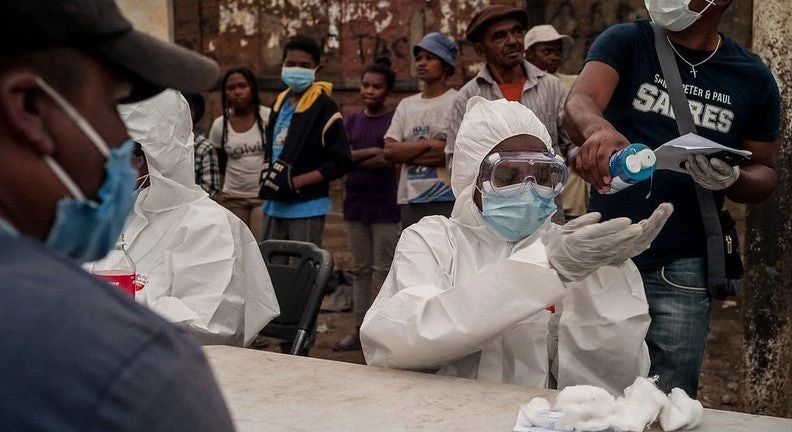 A COVID-19 testing center in Madagascar. Henitsoa Rafalia/World Bank
A COVID-19 testing center in Madagascar. Henitsoa Rafalia/World Bank
The COVID-19 (coronavirus) pandemic has substantial health, social, and economic impacts in all countries, rich and poor. It is a sharp reminder that everyone, everywhere should have access to quality and affordable health services. We will be living with COVID-19 and its consequences for a long time to come.
Health systems now face the dual challenge of responding to the outbreak and maintaining essential services. COVID-19 has reignited a debate from previous health emergencies: how to make health systems sufficiently resilient to manage shocks in ways that protect everyone, especially the most vulnerable? Where do we need to start thinking differently, and what can we do differently, to be better prepared for emergencies and make progress towards univeral health coverage (UHC)? What is the new normal for health systems and UHC?
The UHC movement has focused on ensuring that health services are accessible and affordable for all. However, achieving UHC also depends on disease prevention, health promotion and emergency preparedness. The measurement of health service coverage, which is the focus of the Sustainable Development Goals indicator 3.8.1, includes International Health Regulations core capacities to detect, assess and report public health events.
COVID-19 demands that we think about UHC as protecting everyone. It calls for a renewed and urgent focus on specific public health actions as the first step towards UHC. This includes special attention to common goods for health – things like disease surveillance, laboratories and diagnosis, health information systems, communications about changing behaviors, engagement of communities and building public trust in the health system. These will largely not be provided by markets, hence they require public financing and collective action. Relative neglect of these areas has left communities more vulnerable to epidemics and other shocks.
As emphasized by the World Health Assembly last month, COVID-19 is a global crisis requiring sustained international solidarity and action. UHC2030 – the global movement to strengthen health systems for universal coverage – has an important role to play in bringing partners together on a joint vision for resilient health systems and priority actions.
UHC2030’s new discussion paper on UHC and emergencies examines the implications of COVID-19 for health systems and highlights key areas where we can take joint action. Its main conclusions are:
1. The new normal for UHC includes greater emphasis on common goods for health
COVID-19 reinforces previous experience that strong health systems based on primary health care are the foundation for health security and UHC. National policies to promote UHC have sometimes neglected prevention, promotion and emergency preparedness. There’s a strong case to position these public health actions as the first step towards UHC, and a core responsibility of governments.
2. Invest more and better in health – for both health and economic reasons
Countries are facing economic recessions because of the crisis. But the pandemic gives compelling reasons to prioritize health investments now: the costs are small compared with the economic costs of not acting. Health financing policies should prioritize public financing for health and remove financial barriers to services.
3. Seize the moment: opportunities for change can benefit both health security and UHC
The pandemic has shown that the choice is not between health security and UHC: strong health systems, grounded in primary health care, are needed for both. The crisis reinforces the need for global cooperation on priorities including addressing health workforce shortages and ensuring equitable access to new diagnostics , medicines and vaccines. If retained, positive innovations developed during the pandemic – in service delivery models, information technologies, product development, financing, governance, and ways of working – will contribute to progress on both health security and UHC.
4. Local and global movements for shared health goals
Governments need to work closely with local communities as part of the solution to the pandemic; this is also a key lesson from the Ebola crisis in 2014-15. For populations to be better protected in future, governments must create space for communities to participate actively in shaping more equitable health systems. Strong civil society voices have a vital role in demanding health systems that protect everyone.
These conclusions, and the proposed action agenda that the discussion paper sets forth, are important. Faced by COVID-19, we must all be united in strengthening health systems, especially primary health care, both to respond to emergencies effectively and to reach the whole population, leaving no one behind.
Read the UHC2030 discussion paper – Living with COVID-19: Time to get our act together on health emergencies and UHC
Watch the recording of the UHC2030 discussion paper launch event



Join the Conversation